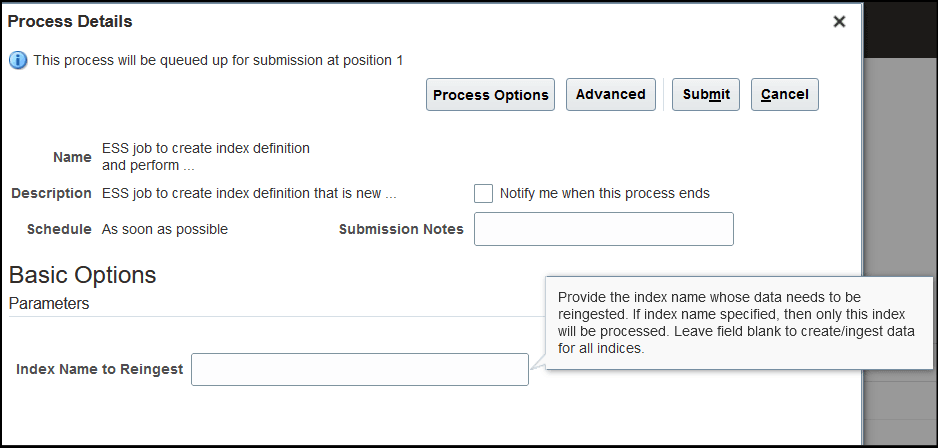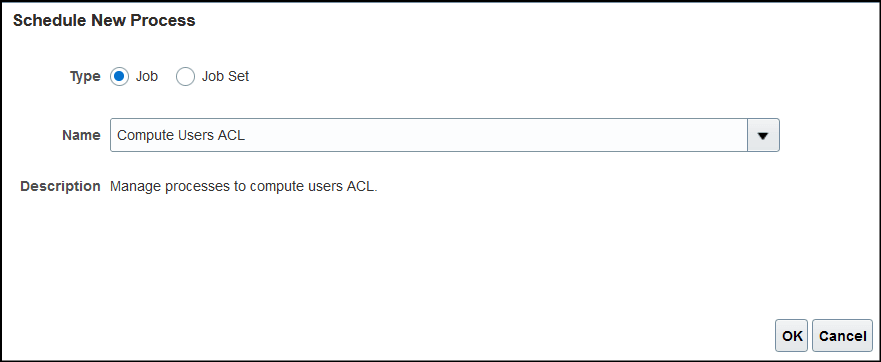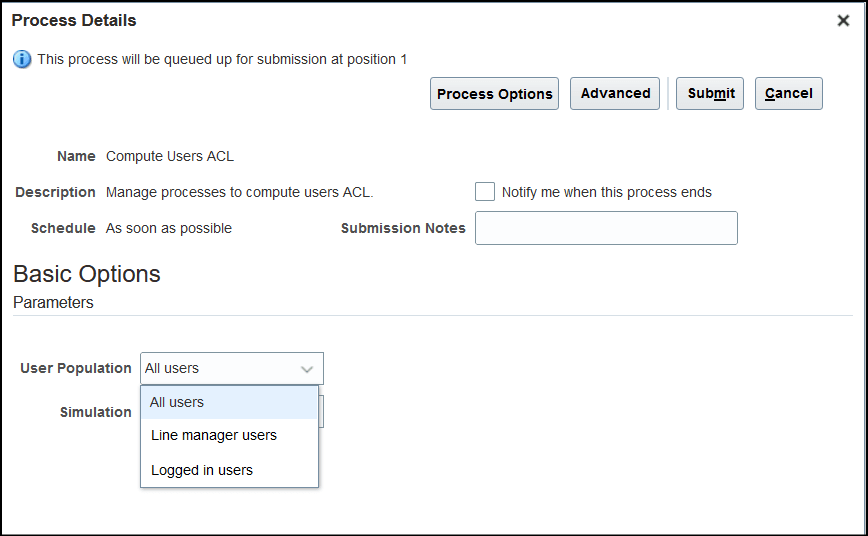 Oracle Search-Based Journeys
Oracle Search-Based Journeys
Oracle Search is a powerful search engine in HCM Cloud that can search fast across large volumes of data and return highly relevant results. The Oracle Search-based Journey search provides a faster search experience and introduces these new search capabilities:
-
Improved relevancy of results.
-
Ability to search based on additional fields, such as Person Number, Person Name, or Journey Name.
This feature uses Oracle Search which enhances your search experience by delivering fast and better quality results.
Steps to Enable
Here are the steps to enable Oracle Search for Journeys:
-
Set Profile Options
-
Run Process to Create Index Definition and Perform Initial Ingest
-
Review Logging Profile Options
-
Run Process to Create Access Control List (ACL) Index
-
Run the Compute Users ACL Process
-
Set Journeys Search Profile Options
Step1: Set Profile Options
In the Setup and Maintenance work area, use the Manage Administrator Profile Values task to review and correctly configure the profile options shown in this table.
|
Profile Option Code |
Profile Display Name |
Profile Option Description |
Application |
Module |
Required Profile Level |
Required Profile Value |
|---|---|---|---|---|---|---|
|
ORA_FND_SEARCH_EXT_ENABLED |
Enable/Disable Search Ext Framework |
This profile is used to check if Search Extension is enabled. |
Oracle Middleware Extensions for Applications |
Oracle Middleware Extensions for Applications |
Site | Yes |
|
HRC_ELASTIC_SEARCH_ENABLED |
HRC: Enable Elastic Search |
Enable Elastic Search-based search engine for HCM objects search. |
HCM Common Architecture |
Search Framework |
Site | Y |
|
PER_SEARCH_LOGIN_EVENT_PUB |
PER: User Login Event Publication for Search |
Method of publication of user login events for HCM objects search purpose. |
Global Human Resources |
Security | Site | ATOM |
|
ORA_PER_CHK_ORACLE_SEARCH_INDEX_ENABLED |
Oracle Search Index for Journeys Enabled |
Enable Oracle Search index for Journeys. This needs to be set before doing the initial ingest or any incremental ingestion. If this is not enabled, no elastic ingestion will happen. |
Global Human Resources |
Allocated Checklists |
Site | Y |
Optional Profile Setup
If advised by Oracle, set the profile options shown in this table.
| Profile Option Code | Profile Display Name | Application | Module | Required Profile Level | Required Profile Value |
|---|---|---|---|---|---|
|
ORA_FND_SEARCH_INITIAL_INGEST_THREAD_COUNT |
Number of threads used for initial ingest process |
Oracle Middleware Extensions for Applications |
Oracle Middleware Extensions for Applications |
Site |
As recommended by Oracle |
|
ORA_FND_SEARCH_FETCH_COUNT |
Row fetch count for initial ingest process |
Oracle Middleware Extensions for Applications |
Oracle Middleware Extensions for Applications |
Site |
As recommended by Oracle |
Step 2: Run Process to Create Index Definition and Perform Initial Ingest
You need to run this job (process) twice, once each for the parameters specified in the parameter table.
This process is secured with the FND_MANAGE_SCHEDULED_JOB_DEFINITION_PRIV function privilege. The privilege is available in the ORA_FND_APPLICATION_ADMINISTRATOR_JOB or ORA_FND_APPLICATION_DEVELOPER_JOB job roles.
Use Tools > Scheduled Processes to run the process specified in this table:
| Job Name |
|---|
|
ESS job to create index definition and perform initial ingest to OSCS |
Note: OSCS stands for Oracle Search Cloud Service
|
Parameter Name |
Parameter Value |
|---|---|
|
Index Name to Reingest |
fa-hcm-workerjourney |
|
Index Name to Reingest |
fa-hcm-workerjourneytask |

ESS Job to Create Index Definition and Perform Initial Ingest to OSCS Process

ESS Job to Create Index Definition and Perform Initial Ingest to OSCS Parameter Page
Step 3: Review Logging Profile Options
ACL processes need to run with certain minimal logging capabilities turned on. In the Setup and Maintenance work area, use the Manage Administrator Profile Values task to review and correctly configure the profile options shown in this table.
| Profile Option Code | Profile Display Name | Application | Module | Required Profile Level | Required Profile Value |
|---|---|---|---|---|---|
|
AFLOG_ENABLED |
FND: Log Enabled |
Oracle Middleware Extensions for Applications |
Application Logging |
Site or User level for the user running ACL processes |
Yes |
|
AFLOG_LEVEL |
Oracle Middleware Extensions for Applications |
Application Logging |
Site or User level for the user running ACL processes |
Severe | |
|
AFLOG_MODULE |
Oracle Middleware Extensions for Applications |
Application Logging |
Site or User level for the user running ACL processes |
% |
Step 4: Run Process to Create ACL Index
You need to run this job (process), only if the ACL index doesn’t exist yet.
This process is secured with the FND_MANAGE_SCHEDULED_JOB_DEFINITION_PRIV function privilege. The privilege is available in the ORA_FND_APPLICATION_ADMINISTRATOR_JOB or ORA_FND_APPLICATION_DEVELOPER_JOB job roles.
Use Tools > Scheduled Processes to run the process specified in this table.
| Job Name |
|---|
|
ESS job to create index definition and perform initial ingest to OSCS |
|
Parameter Name |
Parameter Value |
|---|---|
|
Index Name to Reingest |
fa-hcm-acl |
Step 5: Run the Compute Users ACL Process
The Compute Users ACL process is secured with the FND_MANAGE_SCHEDULED_JOB_DEFINITION_PRIV function privilege. The privilege is available in the ORA_FND_APPLICATION_ADMINISTRATOR_JOB or ORA_FND_APPLICATION_DEVELOPER_JOB job roles.
Use Tools > Scheduled Processes to run the process specified in this table, one time only.
| Job Name | Parameter Name | Parameter Value |
|---|---|---|
|
Compute Users ACL |
User Population |
All users |

Compute Users ACL Process

Compute Users ACL Parameter Page
Then, schedule the following processes as described in these tables.
Note: You need to schedule the processes only if they aren’t scheduled yet.
| Job Name | Frequency |
|---|---|
|
Compute Users ACL by Event |
Every 15 - 60 minutes |
| Job Name | Parameter Name | Parameter Value | Frequency |
|---|---|---|---|
|
Compute Users ACL |
User Population |
Logged in users |
Every 30 - 120 minutes |
Step 6: Set Journeys Search Profile Options
In the Setup and Maintenance work area, use the Manage Administrator Profile Values task to review and correctly configure the profile options shown in this table.
| Profile Option Code | Profile Display Name | Profile Option Description | Application | Module | Required Profile Level | Required Profile Value |
|---|---|---|---|---|---|---|
|
ORA_PER_CHK_ORACLE_SEARCH_UI_ENABLED |
Oracle Search for Journeys Enabled |
Enable Oracle Search for Journeys for My Journeys, Team Journeys, and Organization Journeys UIs. Note: Enabling this profile option will display Team Journeys and Organization Journeys tab instead of existing Assigned Journeys tab. |
Global Human Resources |
Allocated Checklists |
Site | Y |
|
ORA_PER_CHK_ORACLE_SEARCH_DIRECT_INGEST_ENABLED |
Direct Uptake of Data for Oracle Search in Journeys Enabled |
Enable direct uptake of data for Oracle Search in Journeys. This profile option enables direct ingestion during UI operations instead of the default near real time ingestion. This only affects incremental ingestion during any updates happening in the UI. The ingestion bypasses the queue and is directly done on the index which guarantees the elastic-based journeys UI to show latest data immediately. |
Global Human Resources |
Allocated Checklists |
Site | Y |
Tips And Considerations
-
If there is a discrepancy between objects stored in the database versus in the index, there is no simple way to correct the differences. This behavior can happen immediately after running the initial ingestion process, so rerunning the initial ingestion process doesn't always solve the issue and may not be always possible. The only way for users at the moment is to use the individual document ingestion API.
-
Even a single excessively large document can make the entire full ingestion process to fail.
-
Users have to manually run the full ingestion process after upgrades and separately for every index they use. When a user upgrades their environment, including the production environment, the new code may require related index changes. Such an upgrade will only be fully functional for users when the full ingestion process completes successfully. It means that Oracle Search-based features may not work until that time.
-
Users have to manually run the full ingestion process after production to test (P2T).
-
When setting up an Oracle Search-based feature for the first time in a pod, including the production pod, the user has to first turn on the feature before creating the required indexes by running the full ingestion process. It means that the feature is unavailable for a certain time (even hours).
Key Resources
-
For more information about journeys, refer to the Implementing and Using Journeys guide on Oracle Help Center.
-
Oracle Search-Based Global Search feature in the 22B HCM Common What's New.
-
Set Up Oracle Search for HCM > Chapter Oracle Search Cloud Service Setup in the Using Common Features for HCM guide.
Access Requirements
- You need the FND_MANAGE_SCHEDULED_JOB_DEFINITION_PRIV function privilege to run the ESS job to create index definition and perform initial ingest to OSCS and Compute Users ACL ESS processes. The privilege is available in the ORA_FND_APPLICATION_ADMINISTRATOR_JOB and ORA_FND_APPLICATION_DEVELOPER_JOB job roles.
-
Ensure that all users who have access to Journeys have the following privilege: HRC_ACCESS_HCM_COMMON_COMPONENTS_PRIV